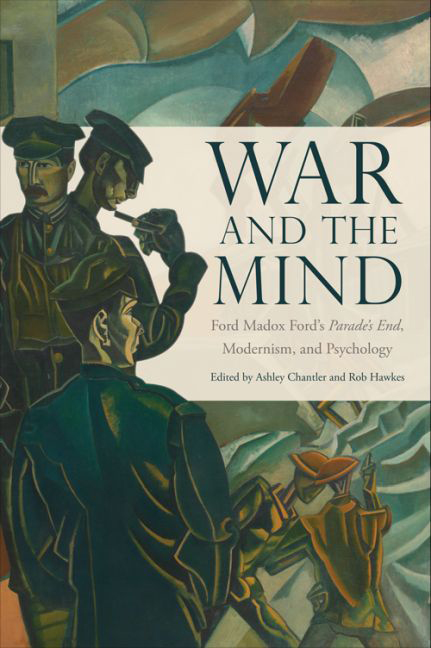Book contents
- Frontmatter
- Contents
- Acknowledgements
- Introduction
- 1 ‘Sex ferocity’ and ‘the sadic lusts of certain novelists’: Sexuality, Sadomasochism, and Suppression in Parade's End
- 2 Freud Madox Ford: Impressionism, Psychoanalytic Trauma Theory, and Ford's Wartime Writing
- 3 Empathy, Trauma, and the Space of War in Parade's End
- 4 Fellow Feeling in Ford's Last Post: Modernist Empathy and the Eighteenth-Century Man
- 5 The Self-Analysis of Christopher Tietjens
- 6 Composing the War and the Mind; Composing Parade's End
- 7 The Work of Sleep: Insomnia and Discipline in Ford and Sassoon
- 8 Representing Shell Shock: A Return to Ford and Rebecca West
- 9 ‘I hate soldiering’: Ford, May Sinclair, and War Heroism
- 10 Peace of Mind in Parade's End
- Notes on Contributors
- Bibliography
- Index
6 - Composing the War and the Mind; Composing Parade's End
Published online by Cambridge University Press: 15 September 2017
- Frontmatter
- Contents
- Acknowledgements
- Introduction
- 1 ‘Sex ferocity’ and ‘the sadic lusts of certain novelists’: Sexuality, Sadomasochism, and Suppression in Parade's End
- 2 Freud Madox Ford: Impressionism, Psychoanalytic Trauma Theory, and Ford's Wartime Writing
- 3 Empathy, Trauma, and the Space of War in Parade's End
- 4 Fellow Feeling in Ford's Last Post: Modernist Empathy and the Eighteenth-Century Man
- 5 The Self-Analysis of Christopher Tietjens
- 6 Composing the War and the Mind; Composing Parade's End
- 7 The Work of Sleep: Insomnia and Discipline in Ford and Sassoon
- 8 Representing Shell Shock: A Return to Ford and Rebecca West
- 9 ‘I hate soldiering’: Ford, May Sinclair, and War Heroism
- 10 Peace of Mind in Parade's End
- Notes on Contributors
- Bibliography
- Index
Summary
Testifying to the First World War seems to have gone hand in hand with the war itself: the vast amount of literature, both fiction and non-fiction, alongside works of art in various other media produced by those involved in the hostilities, attests to a profound need to bear witness to the experience of ‘Armageddon’. However, the time which elapsed between the experience of war itself and the act of relating it points to the extreme complexity of testifying. When Ford set out to write Parade's End, in 1923, he was acutely aware of the difficulties artists desiring to testify were faced with. Since he considered that overstating the horrors and the heroisms of the war would create indifference, he endeavoured above all to depict the conflict in such a way that would not blunt the sensitivity of his readers, so shunned exaggeration:
I have not exaggerated either the physical horrors or the mental distresses of that period. On the contrary I have selected for treatment less horrible episodes than I might well have rendered and I have rendered them with more equanimity than might well have been displayed.
Yet, as the first fully mechanised war, World War One was unprecedented in many respects, especially in terms of destruction – which it brought to a whole new scale and, as a result, generated entirely new visual and aural experiences – and in terms of its impact on the psyche, as the attrition rates and psychical losses during the conflict show.
Ford was attuned to looking at and listening to the world with an artist's eyes and ears from an early age, not least because of his childhood amongst the second-generation Pre-Raphaelites and his musical training. Highly sensitised to the world, Ford was naturally very much interested in the visual as well as in the aural and acoustic aspects of the Great War, as his letters from the Front to Joseph Conrad prove.
- Type
- Chapter
- Information
- War and the MindFord Madox Ford's Parade's End, Modernism, and Psychology, pp. 92 - 111Publisher: Edinburgh University PressPrint publication year: 2015

